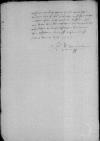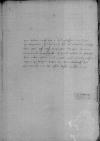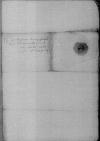List #4325
Ioannes DANTISCUS do Gdańsk Town CouncilLöbau (Lubawa), 1533-07-04
| odebrano Gdańsk (Danzig) Rękopiśmienne podstawy źródłowe:
Pomocnicze podstawy źródłowe:
| ||||||
Tekst + aparat krytyczny + komentarz Zwykły tekst Tekst + komentarz Tekst + aparat krytyczny
Denn ersamen, namhafftigen hernn
Unsernn fruntlichenn grues mit erbittung, was wir E(wr) Er(barkei)t liebs unnd nuczlichs wolgefallens umber werdenn wissenn zcwthun, / zcuvoran. / Ersame, namhafftige hernn, gunstige frunde unnd landsleutte. /
Wir habenn nicht mocht nochlossenn mit dissem botten, / wie woll behafft inn schwerer feurstroff, / die Gott der allemechtige umb unser sundt willenn uber uns hot gesendt, / E(wr) Er(barkei)t vor vil ehr und guts, uns negst inn unserm  APG 300, 53, 249, p. 40 besserem unnd hocherem stande zcwtruge, / dar inne wir E(wr) Er(barkei)t nuczlicher unnd fromlicher möchtenn sein, / nicht werdenn lossenn, / die wir Gotte dem allemechtigenn inn langweriger gesundtheit unnd gelugseligem zcwnhemenn thun befhelenn. /
APG 300, 53, 249, p. 40 besserem unnd hocherem stande zcwtruge, / dar inne wir E(wr) Er(barkei)t nuczlicher unnd fromlicher möchtenn sein, / nicht werdenn lossenn, / die wir Gotte dem allemechtigenn inn langweriger gesundtheit unnd gelugseligem zcwnhemenn thun befhelenn. /
Dat(um) uff unserm slosse
Jo(annes), b(ischoff) zu Culmen m(an)u p(ro)pria adscribed, in the hand of Dantiscus⌈
Postscript:
Wir habenn negst bey E(wr) Er(barkei)t gelossenn die copien der legationn



